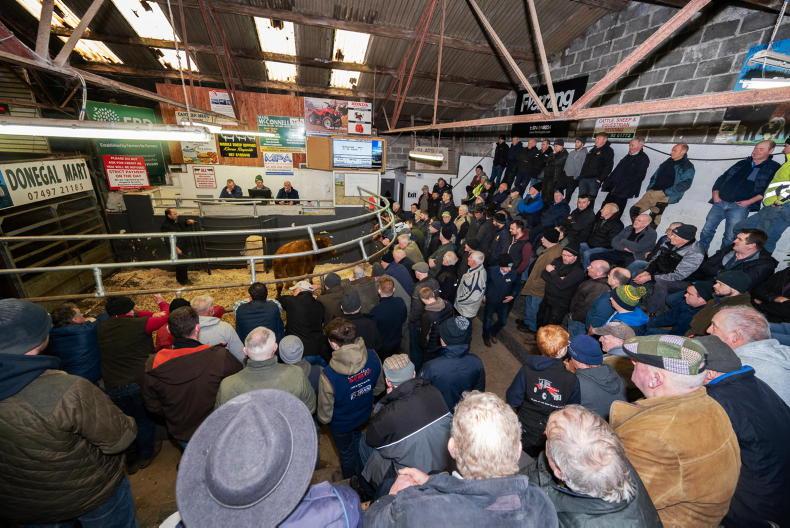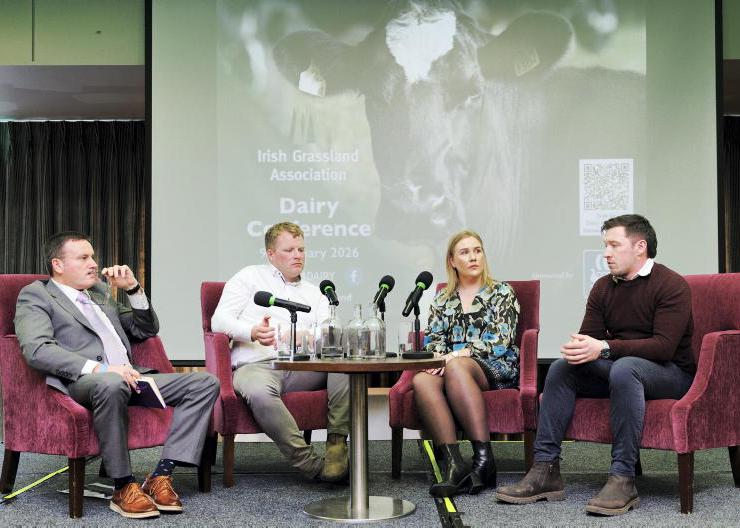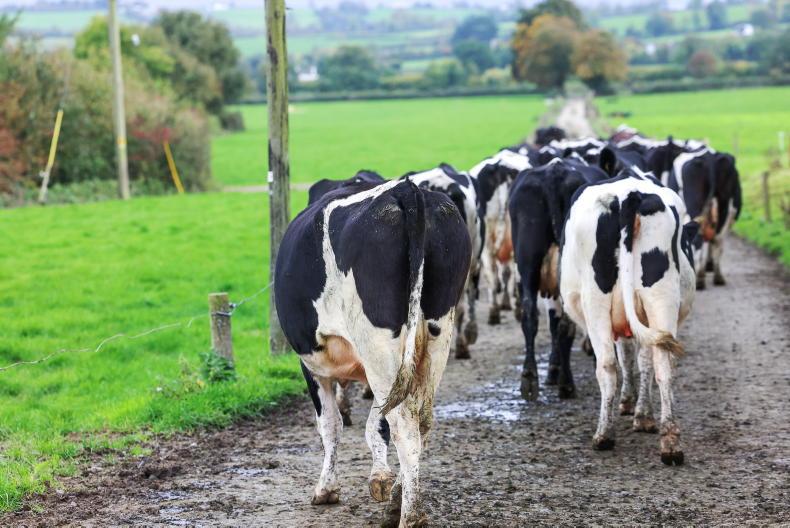At the start of every year, it is a good idea to review your finances and banking arrangements, as there could be changes year on year that will impact on the family farm in relation to banking, interest rates, taxes and VAT.
Free banking a thing of the past
Free banking is practically a thing of the past, as most banks are now charging a flat fee per month regardless of what balance you hold in your current account.
However, there are ways to ensure you do not pay excessive interest charges.
If you have a farm overdraft, do not exceed the limit, as this will lead to surcharges (additional fees) which may cost up to 1% per month.By using online banking, you can keep up to date on your balance and ensure you don’t exceed your limits and make direct online payments.By using a debit card, you can avoid cheque charges and avail of contactless payments (limit now increased to €50 per transaction). By using a Visa business card instead of a personal credit card (which can prove very expensive), you can keep track of your farm expenses. As this card is cleared each month from your current account, there should be no interest charges. This can be a very useful card for purchasing goods and services for your farm business.Digital banks such as Revolut and N26 issue prepaid cards which are useful for parents transferring funds to students and young adults who have these digital accounts. Currently no transaction, maintenance fees or interest charges apply unless you exceed your ATM limit or usage per month.Interest rates
Interest rates on mortgages, commercial loans and agricultural loans vary across the banks.
Do your homework before committing to these loans and shop around.
Fixed versus variable
It is important to be aware of the difference between a variable rate loan and a fixed rate.
A fixed-rate term means your loan interest rate is fixed for a particular period and if you wish to repay your loan early you may incur an early settlement fee. A variable rate loan means the interest rate may fluctuate over the term of the loan It is really important to check these loan rates on a regular basis to ensure they are competitive, in particular if you hold a long-term commercial and/or agri loan or mortgage as these are long-term investments.Financing the car
Car loans can prove expensive as they are short-term facilities.
Be careful with personal contract plans (PCP) for cars, as with this type of facility you may never own the car.
The monthly repayment will be lower than a bank loan, but at the end of the term, you will need to pay the outstanding monies owing or enter into a new PCP to change the car.
Leasing and hire purchase (HP) are other ways of financing cars and farm machinery and once you make the final payment you will own the asset.
No escaping taxes
Personal income tax credits (due to every taxpayer resident in Ireland) were not changed in Budget 2021, except for the age tax credits (for people over 65) which moves from €70 to €245 (if single/widowed) and €140 to €490 (if married/civil partnership).
Tax credits help with your tax bill, so it is important to avail of all your entitlements.
When doing your tax return each year, remember to include any medical expenses, pension contributions and any other tax reliefs that you may be entitled to.
These include tax relief on residential investment properties and annual capital gains exception (the first €1,270 of a chargeable gain is exempt from tax on a disposal of a capital asset).
Also, if you are self-employed/farming and your partner works with you, ensure that the full entitlement of income tax exemptions is taken up by your partner.
Capital gains tax (CGT)
If 2021 is the year that you will be transferring a site to a son or daughter in order for them to build their principle private residence, CGT is an important consideration.
Flat rate VAT refund increase
As of 1 January 2021, the flat rate of VAT refund for farmers who are not registered for VAT increased to 5.6% (up from 5.4%).
This is applicable to all sales from that date.
There are various VAT refunds that are applicable to unregistered farmers, such as capital expenditure VAT refund attributed to any capital expenditure (invoices necessary) relating to land and farm buildings investment.
If you are a VAT-registered farmer, you must keep all invoices for your VAT return. For registered farmers VAT on livestock is 4.8%.
Taking a little time to review your financial situation at the start of the year can mean savings. They might be small, but every cent counts.
At the start of every year, it is a good idea to review your finances and banking arrangements, as there could be changes year on year that will impact on the family farm in relation to banking, interest rates, taxes and VAT.
Free banking a thing of the past
Free banking is practically a thing of the past, as most banks are now charging a flat fee per month regardless of what balance you hold in your current account.
However, there are ways to ensure you do not pay excessive interest charges.
If you have a farm overdraft, do not exceed the limit, as this will lead to surcharges (additional fees) which may cost up to 1% per month.By using online banking, you can keep up to date on your balance and ensure you don’t exceed your limits and make direct online payments.By using a debit card, you can avoid cheque charges and avail of contactless payments (limit now increased to €50 per transaction). By using a Visa business card instead of a personal credit card (which can prove very expensive), you can keep track of your farm expenses. As this card is cleared each month from your current account, there should be no interest charges. This can be a very useful card for purchasing goods and services for your farm business.Digital banks such as Revolut and N26 issue prepaid cards which are useful for parents transferring funds to students and young adults who have these digital accounts. Currently no transaction, maintenance fees or interest charges apply unless you exceed your ATM limit or usage per month.Interest rates
Interest rates on mortgages, commercial loans and agricultural loans vary across the banks.
Do your homework before committing to these loans and shop around.
Fixed versus variable
It is important to be aware of the difference between a variable rate loan and a fixed rate.
A fixed-rate term means your loan interest rate is fixed for a particular period and if you wish to repay your loan early you may incur an early settlement fee. A variable rate loan means the interest rate may fluctuate over the term of the loan It is really important to check these loan rates on a regular basis to ensure they are competitive, in particular if you hold a long-term commercial and/or agri loan or mortgage as these are long-term investments.Financing the car
Car loans can prove expensive as they are short-term facilities.
Be careful with personal contract plans (PCP) for cars, as with this type of facility you may never own the car.
The monthly repayment will be lower than a bank loan, but at the end of the term, you will need to pay the outstanding monies owing or enter into a new PCP to change the car.
Leasing and hire purchase (HP) are other ways of financing cars and farm machinery and once you make the final payment you will own the asset.
No escaping taxes
Personal income tax credits (due to every taxpayer resident in Ireland) were not changed in Budget 2021, except for the age tax credits (for people over 65) which moves from €70 to €245 (if single/widowed) and €140 to €490 (if married/civil partnership).
Tax credits help with your tax bill, so it is important to avail of all your entitlements.
When doing your tax return each year, remember to include any medical expenses, pension contributions and any other tax reliefs that you may be entitled to.
These include tax relief on residential investment properties and annual capital gains exception (the first €1,270 of a chargeable gain is exempt from tax on a disposal of a capital asset).
Also, if you are self-employed/farming and your partner works with you, ensure that the full entitlement of income tax exemptions is taken up by your partner.
Capital gains tax (CGT)
If 2021 is the year that you will be transferring a site to a son or daughter in order for them to build their principle private residence, CGT is an important consideration.
Flat rate VAT refund increase
As of 1 January 2021, the flat rate of VAT refund for farmers who are not registered for VAT increased to 5.6% (up from 5.4%).
This is applicable to all sales from that date.
There are various VAT refunds that are applicable to unregistered farmers, such as capital expenditure VAT refund attributed to any capital expenditure (invoices necessary) relating to land and farm buildings investment.
If you are a VAT-registered farmer, you must keep all invoices for your VAT return. For registered farmers VAT on livestock is 4.8%.
Taking a little time to review your financial situation at the start of the year can mean savings. They might be small, but every cent counts.










SHARING OPTIONS